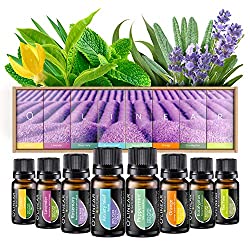
Essential oils have some amazing medicinal and therapeutic properties if used properly, but they can also be dangerous if not used properly.
Because essential oils are made from plant extracts, the likelihood of allergic reaction is high, especially for those who are known to have hay fever or other plant based, pollen, or grass type allergies.
There is also the possibility of toxicity when overused or not used properly. It’s important to note that essential oils, while having therapeutic properties, are not classified as medications and therefore are not regulated like over the counter drugs would be. Therefore, there is not a requirement to list contraindications on the labels and warnings are also not required.
If you plan to use essential oils for any purpose, including simply using them as a fragrance source, it is important to be aware of the potential dangers.
When using essential oils, whether for aromatherapy or for treating certain conditions, it is important to keep the following in mind:
Do not use essential oils directly on your skin if you are pregnant. While there are some that your doctor may discuss with you to use, unless your doctor or medical professional clearly tells you to use them, stay away from essential oils while pregnant or nursing – period.
Do not use essential oils for aromatherapy on anyone under the age of five and then use caution for essential oil aromatherapy on all children, and it is recommended that essential oils not be used directly on the skin of anyone under the age of twelve.
If using essential oils directly on the skin, a skin patch test should be performed to test for allergic reaction prior to any treatment. This can be accomplished by touching a very small amount of essential oil to the inside of the wrist and waiting 24 hours to see if there is a reaction of any kind. If the skin reacts in any way, such as turning red, blotchy, burning, itchy, swollen, etc, then do not use that particular essential oil for any reason, including aromatherapy.
Never use essential oils near sensitive skin, around the eyes, broken skin, or near mucous membranes.
Research each oil before use for toxicity and likelihood of allergic reaction as well as for instructions on how to properly use each essential oil.
Essential Oil Skin Allergy Dangers
Essential oils that are known to have a higher than average allergic reaction on the skin are:
Basil, Bay, Benzoin, Birch, Black Pepper, Cinnamon, Cassia, Citronella, Clove, Cumin, Fennel, Fir, Lemongrass, Verbena, Oak Moss, Oregano, Parsley, Peppermint, Pimento Berry, Pine (high), Thyme, Wintergreen, and others that may not be listed here
Remember, just because an essential oil is not listed here doesn’t mean it won’t cause an allergic reaction to your skin; these are just some of the oils known to have a higher than average allergy reaction rate when used on the skin.
Essential Oil Aromatherapy Dangers
When using essential oils for aromatherapy, you should do a bit of research to determine what scent, or as the name implies, aroma, offers the result you are seeking. For example, some aromas will wake up your senses and help energize you, while others will calm you and help you rest or sleep.
As with any drug, if you are using essential oils for relaxation or to aid with sleep, you need to be careful not to use the same oils while operating a car or heavy machinery or at any other time when concentration should not be impaired.
Some essential oils that may cause concentration disruption or cause drowsiness are:
Benoin, Carnation, Chamomile, Geranium, Hops, Hyacinth, Lavender, Mace, Marjoram, Nutmeg, Sandalwood, Valerian, Ylang-Ylang, as well as others that may not be listed here
Essential Oil Toxicity Dangers
As wonderful as the benefits of some essential oils are, it is important to note that some essential oils can indeed be dangerously toxic, especially when absorbed through the skin or taken internally. In fact, no essential oil should ever be ingested without first consulting a licensed physician who is trained in the use of essential oils as a therapeutic tool. The risks of oral ingestion toxicity is simply too great – that’s how powerfully effective essential oils can be.
However, there are some essential oils that have a higher than normal toxicity level, and even some that have been banned in the United States due to their potent and toxic nature. Please note that while the names of these essential oils listed below may sound familiar – such as almond or mustard – this doesn’t mean eating almonds or using mustard condiments on your food is dangerous. What it means is that the essential oil extracted from the plant is too potently dangerous for household use.
Some of the essential oils that have a higher than normal toxicity include:
Almond Bitter, Prussic acid (commonly known as cyanide – highly lethal, even in small doses), Boldo, Calamus, Camphor (excellent in small doses for skin conditions, but highly toxic by oral ingestion), Cassia, Horseradish, Mugwort, Mustard, Pennyroyal, Rue, Sassafras, Savin (sabinyl acetate), Tansy, Thuja, Wintergreen (Methyl Salicylate), Wormseed, Wormwood
Again, it is always best to consult a physician when using any household, homeopathic, or over the counter treatment for anything therapeutic benefit, and essential oils are no different. Additionally, be very careful using any essential oils, even aromatherapy, around children, pregnant or nursing women, and even some small pets.
Essential oils aren’t dangerous to the point they should be avoided, as long as you know what you are using and take precautions. Do the research before you use any essential oil and be sure you are using them properly and essential oils can have wonderful benefits both through aromatherapy and therapeutic qualities.
